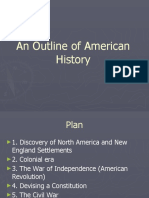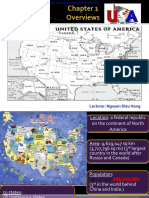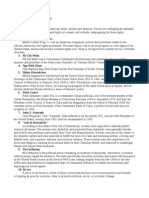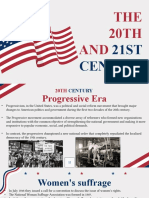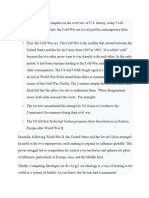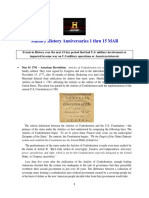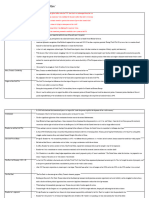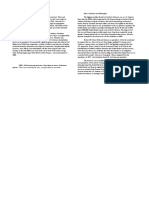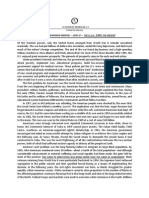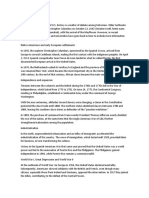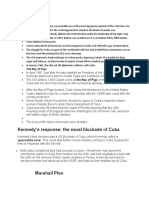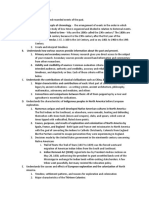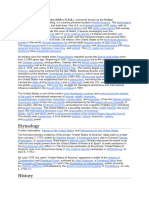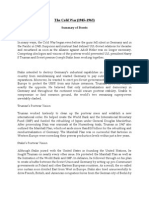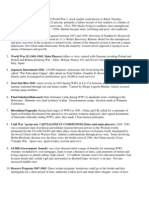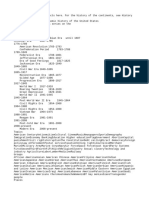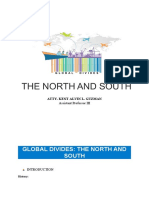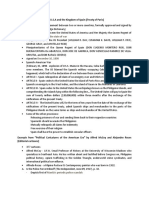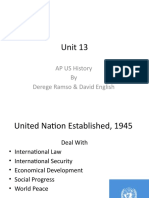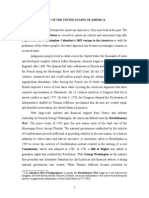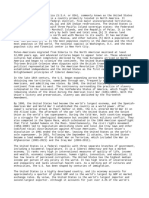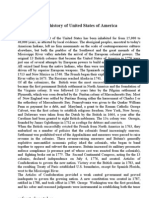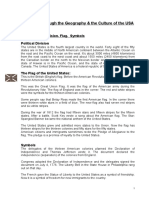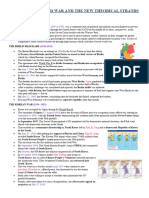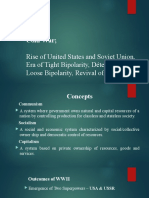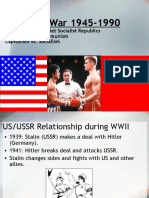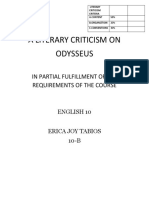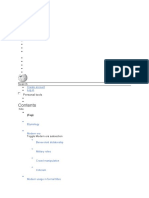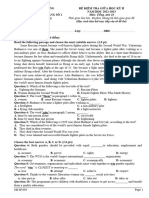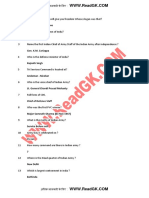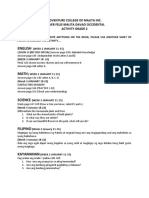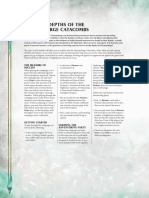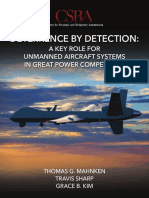A Chronology of Key Events of US History
A Chronology of Key Events of US History
Uploaded by
anon_930849151Copyright:
Available Formats
A Chronology of Key Events of US History
A Chronology of Key Events of US History
Uploaded by
anon_930849151Original Description:
Copyright
Available Formats
Share this document
Did you find this document useful?
Is this content inappropriate?
Copyright:
Available Formats
A Chronology of Key Events of US History
A Chronology of Key Events of US History
Uploaded by
anon_930849151Copyright:
Available Formats
A Chronology of Key Events of US History
A Chronology of Key Events of US History
1565 – First permanent European settlement in North America United States profile – St
Augustine, present-day Florida – founded by the Spanish. North America is already
inhabited by several distinct groups of people, who go into decline following the arrival of
settlers.
1607 – Jamestown, Virginia, founded by English settlers, who begin growing tobacco.
War of Independence
1775 – American Revolution: George Washington leads colonist Continental Army to fight
against British rule.
1776 4 July – Thomas Jefferson’s American Declaration of Independence endorsed by
Congress; colonies declare independence.
1781 – Rebel states form loose confederation, codified in Articles of Confederation, after
defeating the British at the Battle of Yorktown.
1783 – Britain accepts loss of colonies by virtue of Treaty of Paris.
1787 – Founding Fathers draw up new constitution for United States of America.
Constitution comes into effect in 1788.
1789 – George Washington elected first president of USA.
1791 – Bill of Rights guarantees individual freedom.
1808 – Atlantic slave trade abolished.
Downloaded from www.csstimes.pk | 1
A Chronology of Key Events of US History
1846-48 – US acquires vast tracts of Mexican territory in wake of Mexican War including
California and New Mexico.
Civil War
1854 – Opponents of slavery, or abolitionists, set up Republican Party.
1860 – Republican candidate Abraham Lincoln elected president.
1860-61 – Eleven pro-slavery southern states secede from Union and form Confederate
States of America under leadership of Jefferson Davis, triggering civil war with abolitionist
northern states.
World War I and the Great Depression
1917-18 – US intervenes in World War I, rejects membership of League of Nations.
1920 – Women given the right to vote under the Nineteenth Amendment.
1924 – Congress gives indigenous people right to citizenship.
1933 – President Franklin D Roosevelt launches “New Deal” recovery programme which
includes major public works. Sale of alcohol resumes.
World War II and the Cold War
1941 – Japanese warplanes attack US fleet at Pearl Harbour in Hawaii; US declares war on
Japan; Germany declares war on US, which thereafter intervenes on a massive scale in
World War II, eventually helping to defeat Germany.
1945 – US drops two atomic bombs on Hiroshima and Nagasaki. Japan surrenders.
1947 – US enunciates policy of aid for nations it deems threatened by communism in what
became known as the Truman Doctrine. Cold War with Soviet Union begins.
1948 – America’s programme to revive ailing post-war European economies – the Marshall
Plan – comes into force. Some $13bn is disbursed over four years and the plan is regarded
as a success.
1950-53 – US forces play leading role against North Korean and Chinese troops in Korean
War.
Downloaded from www.csstimes.pk | 2
A Chronology of Key Events of US History
Desegregation and the Vietnam War
1954 – Racial segregation in schools becomes unconstitutional; start of campaign of civil
disobedience to secure civil rights for Americans of African descent.
1960 – Democratic Party candidate John F Kennedy elected president, narrowly defeating
his rival Richard Nixon.
1961 – Bay of Pigs invasion: an unsuccessful attempt to invade Cuba by Cuban exiles,
organised and financed by Washington.
1962 – US compels Soviet Union to withdraw nuclear weapons from Cuba in what has
become known as the Cuban missile crisis.
1963 – President John F Kennedy assassinated; Lyndon Johnson becomes president.
1968 – Black civil rights leader Martin Luther King assassinated.
1969 – Republican Party candidate Richard Nixon elected president amid growing public
opposition to Vietnam War. US military presence in Vietnam exceeds 500,000 personnel.
US astronaut Neil Armstrong becomes the first person to walk on the Moon.
1972 – Nixon re-elected and makes historic visit to China.
1976 – Democratic Party candidate Jimmy Carter elected president.
1979 – US embassy in Tehran, Iran, seized by radical students. The 444-day hostage crisis –
including a failed rescue attempt in 1980 – impacts on Carter’s popularity and dominates
the 1980 presidential election campaign.
1983 – US invades Caribbean nation of Grenada, partly prompted by its concerns over the
island’s ties with Cuba.
1988 – Reagan’s vice-president, George Bush, elected president.
1989 – US troops invade Panama, oust its government and arrest its leader, one-time
Central Intelligence Agency informant General Manuel Noriega, on drug-trafficking
charges.
Downloaded from www.csstimes.pk | 3
A Chronology of Key Events of US History
The Clinton years
1992 – Democratic Party candidate Bill Clinton elected president.
1996 – Clinton re-elected, beating Republican rival Bob Dole.
2000 November – Republican Party’s George W Bush wins presidency.
2001 July – US tests its controversial missile defence shield, or “Son of Star Wars”.
11 September attacks
2001 11 September – Co-ordinated suicide attacks on various high-profile targets,
prompting the US to embark on a ”war on terror” which includes the invasion of
Afghanistan and Iraq.
2001 October – US leads massive campaign of air strikes against Afghanistan and helps
opposition forces defeat the Taleban regime and find Saudi-born dissident Osama Bin
Laden, who is suspected of masterminding the 11 September attacks.
2003 February – Space shuttle Columbia’s 28th mission ends in tragedy when the craft
breaks-up while re-entering the atmosphere. The seven astronauts on board are killed.
Obama elected
2008 November – Democratic Senator Barack Obama becomes the first black president of
the United States.
Republican resurgence
2014 November – Republicans win a Senate majority in mid-term elections, gaining control
of both houses of Congress and further reducing President Obama’s room for manoeuvre.
Trump elected president
2016 November – Republican candidate Donald Trump wins presidential election, defeating
Democratic candidate Hillary Clinton in one of the biggest political upsets in US history. He
is inaugurated in January.
2017 January – President Trump signs executive orders restricting visas for people seeking
to enter the US from certain Muslim-majority countries, and barring funding for cities that
Downloaded from www.csstimes.pk | 4
A Chronology of Key Events of US History
shelter illegal immigrants. Both policies are blocked by the courts.
President Trump warns of a military response after North Korea threatens to fire a missile
towards the US Pacific territory of Guam.
Please Share your comments using Facebook ID
Downloaded from www.csstimes.pk | 5
You might also like
- A Concise History of HungaryDocument366 pagesA Concise History of HungaryGergely Vince SzalaiNo ratings yet
- Siege of BudapestDocument82 pagesSiege of BudapestTamas Szabo100% (1)
- An Outline of American HistoryDocument5 pagesAn Outline of American HistoryinzhumedeuNo ratings yet
- An Outline of American HistoryDocument32 pagesAn Outline of American HistoryАружан КенжетаеваNo ratings yet
- Unit 5: The Common Good: General Terms and EventsDocument4 pagesUnit 5: The Common Good: General Terms and EventsLailaS17No ratings yet
- Chapter 1 - Overview-HistoryDocument45 pagesChapter 1 - Overview-Historymafing104No ratings yet
- Chapter 37Document2 pagesChapter 37Paul JonesNo ratings yet
- Coloquio Cultura - Fowler y SosaDocument21 pagesColoquio Cultura - Fowler y SosaGuada FowlerNo ratings yet
- Following The Previous Chapters On The Overview of UDocument10 pagesFollowing The Previous Chapters On The Overview of ULe NhiNo ratings yet
- HistorypraxisreviewDocument3 pagesHistorypraxisreviewapi-656950304No ratings yet
- Military History Anniversaries 0301 Thru 031519Document81 pagesMilitary History Anniversaries 0301 Thru 031519DonnieNo ratings yet
- Am. HistoryDocument16 pagesAm. HistoryParlin PardedeNo ratings yet
- KennedyDocument6 pagesKennedyapi-345327430No ratings yet
- Americanhistorybriefoverview Part IIIDocument47 pagesAmericanhistorybriefoverview Part IIItthuong10136No ratings yet
- Holiday HomeworkDocument3 pagesHoliday Homeworkpablo forbesNo ratings yet
- Postwar AmericaDocument6 pagesPostwar AmericazakboNo ratings yet
- 11 - USA HistoryDocument2 pages11 - USA HistoryTea KarasováNo ratings yet
- USA 1945-Present PDFDocument4 pagesUSA 1945-Present PDFFenix862No ratings yet
- Ответы на вопросы по лекции Фортуна НФ 212 05,06,23Document3 pagesОтветы на вопросы по лекции Фортуна НФ 212 05,06,23Никита ФортунаNo ratings yet
- UntitledDocument7 pagesUntitledShelby WhitingNo ratings yet
- 8.1: Positioning For Global InfluenceDocument9 pages8.1: Positioning For Global Influencelinda_tong_4No ratings yet
- 1947-1975 Korea, Vietnam, South AmericaDocument4 pages1947-1975 Korea, Vietnam, South Americabyf3239No ratings yet
- Causes of The Civil WarDocument11 pagesCauses of The Civil War0469849npNo ratings yet
- History of USADocument3 pagesHistory of USACarlosNo ratings yet
- US History NotesDocument5 pagesUS History NotesAli RAZANo ratings yet
- AmericaDocument12 pagesAmericaTudor NegutescuNo ratings yet
- Css Past Papers Mcqs US HistoryDocument7 pagesCss Past Papers Mcqs US Historymjmuzammil22No ratings yet
- Timeline of The Cold WarDocument5 pagesTimeline of The Cold Warapi-112856800No ratings yet
- UscldwarDocument4 pagesUscldwarapi-554394501No ratings yet
- Trabajo de Ingles U.S.ADocument11 pagesTrabajo de Ingles U.S.ACarlos AlbertoNo ratings yet
- Cold War, 21 Century TextsDocument9 pagesCold War, 21 Century TextsДиана ТербалянNo ratings yet
- History Praxis ReviewDocument6 pagesHistory Praxis Reviewapi-635302166No ratings yet
- The UsaDocument28 pagesThe Usaicasan89No ratings yet
- The Cold War SummaryDocument5 pagesThe Cold War SummaryAbdelAzizAlihNo ratings yet
- DOC1 Final Study GuideDocument10 pagesDOC1 Final Study GuidePeter ChenNo ratings yet
- History of USADocument59 pagesHistory of USAmmrasyf100% (1)
- Global Divides The North and SouthDocument19 pagesGlobal Divides The North and SouthKent Alvin GuzmanNo ratings yet
- Postwar Tension: Truman's Postwar VisionDocument7 pagesPostwar Tension: Truman's Postwar VisiondanieljohnarboledaNo ratings yet
- RIPH - Summary of Week 7 11Document7 pagesRIPH - Summary of Week 7 11Denise Rina de GuzmanNo ratings yet
- Unit 13: AP US History by Derege Ramso & David EnglishDocument55 pagesUnit 13: AP US History by Derege Ramso & David EnglishramdereNo ratings yet
- Resumen Historia de Los EE - UuDocument20 pagesResumen Historia de Los EE - UuMariam SaltoNo ratings yet
- Curs 11 History GovernmentDocument5 pagesCurs 11 History GovernmentInna SunNo ratings yet
- UsaDocument54 pagesUsaRumburakNo ratings yet
- 1898 and Americas Empire in The PhilippiDocument50 pages1898 and Americas Empire in The PhilippiTricia MontillaNo ratings yet
- USA - Referat in EnglezaDocument3 pagesUSA - Referat in EnglezaPredusi RoxanaNo ratings yet
- Unit 3 - World Power and ww1 - Introduction To Unit Material - Wide Margins - Blanks For StudentsDocument4 pagesUnit 3 - World Power and ww1 - Introduction To Unit Material - Wide Margins - Blanks For Studentsapi-332186475No ratings yet
- A Journey Through The Geography & The Culture of The USA USADocument32 pagesA Journey Through The Geography & The Culture of The USA USAJuampi Duboué IuvaroNo ratings yet
- Hot Off The Press History P1 2023Document23 pagesHot Off The Press History P1 2023pedromanaka59No ratings yet
- The USA Is A Beautiful CountryDocument4 pagesThe USA Is A Beautiful CountryCDancik696No ratings yet
- The Declaration of IndependenceDocument20 pagesThe Declaration of IndependenceEdisonSambiliNo ratings yet
- Theme 2Document9 pagesTheme 2Alba Asensio GarcíaNo ratings yet
- APUSH Must Know DatesDocument7 pagesAPUSH Must Know Datessbloo4No ratings yet
- The History of The United States Part 7 (1945-1964)Document54 pagesThe History of The United States Part 7 (1945-1964)TimothyNo ratings yet
- Isabel Schlicht - Palmer Raids Student MaterialsDocument12 pagesIsabel Schlicht - Palmer Raids Student MaterialsIsa SchlichtNo ratings yet
- Early American History - Final Exam: Three Rivers Community College Name: - Wilfredo DoloresDocument9 pagesEarly American History - Final Exam: Three Rivers Community College Name: - Wilfredo DoloresWilfredo Gabriel Dolores SantanaNo ratings yet
- Study Guide For Eoct Test1Document6 pagesStudy Guide For Eoct Test1api-248438174No ratings yet
- Cold War 2 Events, PeopleDocument4 pagesCold War 2 Events, Peoplekennedi.brodie24No ratings yet
- The Cold War Part 2 (1956-1963) : Near The BrinkDocument33 pagesThe Cold War Part 2 (1956-1963) : Near The BrinkTimothy100% (1)
- 2.cold WarDocument43 pages2.cold WarahsanNo ratings yet
- The Cold War4Document31 pagesThe Cold War4Elvira ToktasinovaNo ratings yet
- Rise to Globalism: American Foreign Policy Since 1938, Ninth Revised EditionFrom EverandRise to Globalism: American Foreign Policy Since 1938, Ninth Revised EditionNo ratings yet
- Material Concerning Ukrainian-Jewish Relations (1917-1921)Document106 pagesMaterial Concerning Ukrainian-Jewish Relations (1917-1921)lastivka978No ratings yet
- Scientific Principles of Improvised Warfare and Home Defense - Vol 2 - More Basics - TobiasonDocument184 pagesScientific Principles of Improvised Warfare and Home Defense - Vol 2 - More Basics - TobiasonAntiFascistMilitant100% (2)
- A Literary Criticism On Odysseus: in Partial Fulfillment of The Requirements of The CourseDocument5 pagesA Literary Criticism On Odysseus: in Partial Fulfillment of The Requirements of The CourseErica Joy TabiosNo ratings yet
- SAT Suite Question Bank - ResultsDocument61 pagesSAT Suite Question Bank - ResultsTrác Trương Hữu DuyNo ratings yet
- FartDocument13 pagesFartswzdefgvvNo ratings yet
- (Đề thi gồm có 03 trang) Thời gian làm bài: 60 phút, không kể thời gian giao đềDocument4 pages(Đề thi gồm có 03 trang) Thời gian làm bài: 60 phút, không kể thời gian giao đềminelongaccNo ratings yet
- 3 Theses On The Russian-Ukrainian War, by Kamil GaleevDocument9 pages3 Theses On The Russian-Ukrainian War, by Kamil GaleevALVARO LEITAONo ratings yet
- Coast Artillery Journal - Dec 1943Document101 pagesCoast Artillery Journal - Dec 1943CAP History Library100% (2)
- 1 What Does The Story of The Efv Suggest AboutDocument1 page1 What Does The Story of The Efv Suggest AboutAmit PandeyNo ratings yet
- T9A-FB All-In-One Core Rules 2021 Beta2 enDocument507 pagesT9A-FB All-In-One Core Rules 2021 Beta2 enAsdrrNo ratings yet
- 7.2.2 SLAB: Calculation Note For Argent Finance CorpDocument1 page7.2.2 SLAB: Calculation Note For Argent Finance Corpjp gutierrezNo ratings yet
- Pit War Tortoise InstructionsDocument1 pagePit War Tortoise InstructionsAlbionNo ratings yet
- War SimulationDocument21 pagesWar SimulationEva Camina LunaNo ratings yet
- Celebrating Kargil Vijay Diwas in DSEU Rajokri CampusDocument7 pagesCelebrating Kargil Vijay Diwas in DSEU Rajokri CampusYash GuptaNo ratings yet
- Martin L. Arnaudet Mary Ellen Barrett Paragraph Development A Guide For Students of English 1990Document103 pagesMartin L. Arnaudet Mary Ellen Barrett Paragraph Development A Guide For Students of English 1990Pouyan Mobasher Amini78% (18)
- Fandex Warhammer 40k Codex KrootDocument40 pagesFandex Warhammer 40k Codex Krootiancmtaylor100% (3)
- Franco Regime EssayDocument8 pagesFranco Regime EssayNoelia FrederickNo ratings yet
- Lexico Practice Tests For Nec 176 Trang Fanpage Tai Lieu Tieng Anh Nang CaoDocument177 pagesLexico Practice Tests For Nec 176 Trang Fanpage Tai Lieu Tieng Anh Nang CaoĐăng Khôi TrầnNo ratings yet
- L3 092 SłuchanieDocument5 pagesL3 092 Słuchaniemeroliusz5No ratings yet
- D&D 5e Esmeralda - Island of Revolution and Supernatural Threats (Maztica)Document79 pagesD&D 5e Esmeralda - Island of Revolution and Supernatural Threats (Maztica)Locklear100% (2)
- Indian Defence GKDocument6 pagesIndian Defence GKSomyajit Swain100% (3)
- Battle of Haldighati C2bf16faDocument4 pagesBattle of Haldighati C2bf16faayeshakrish71No ratings yet
- Catalogue of A Collection of Pottery and Porcelain Illustrating Popular British History PDFDocument159 pagesCatalogue of A Collection of Pottery and Porcelain Illustrating Popular British History PDFHo-hoNo ratings yet
- EzzaDocument9 pagesEzzapatienceezaeguNo ratings yet
- English: Adventure College of Malita Inc. Lower Felis Malita Davao Occidental Activity Grade 2Document4 pagesEnglish: Adventure College of Malita Inc. Lower Felis Malita Davao Occidental Activity Grade 2Annacel IndinoNo ratings yet
- Solo Age of Sigmar 2Document11 pagesSolo Age of Sigmar 2JJ GibbousWolvesNo ratings yet
- Flamininus and The Propaganda of LiberationDocument21 pagesFlamininus and The Propaganda of LiberationBorja Garcia de ViedmaNo ratings yet
- Deterrence by Detection:: A Key Role For Unmanned Aircraft Systems in Great Power CompetitionDocument56 pagesDeterrence by Detection:: A Key Role For Unmanned Aircraft Systems in Great Power CompetitionEzzy Latrell KaprangiNo ratings yet



